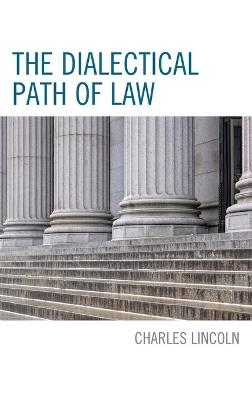
The Dialectical Path of Law
Lexington Books (Verlag)
978-1-7936-3225-8 (ISBN)
This book aims to contribute a single idea – a new way to interpret legal decisions in any field of law and in any capacity of interpreting law through a theory called legal dialects. This theory of the dialectical path of law uses the Hegelian dialectic which compares and contrasts two ideas, showing how they are concurrently the same but separate, without the original ideas losing their inherent and distinctive properties – what in Hegelian terms is referred to as the sublation. To demonstrate this theory, Lincoln takes different aspects of international tax law and corporate law, two fields that seem entirely contradictory, and shows how they are similar without disregarding their key theoretical properties. Primarily focusing on the technical rules of the European and Organisation for Economic Co-operation and Development (OECD) approach to international tax law and the United States approach to tax law, Lincoln shows that both engage in the Hegelian dialectical approach to law.
Charles Lincoln is currently a Ph.D. student at the University of Groningen studying international tax law in the field of business law, European law and tax law.
Chapter 1: Anthropological Structuralism and Law
Chapter 2: Towards More Memes of Theories
Chapter 3: Is there a “Jungian Archetype” of Government? Structuralism and Constitutional Forms of Government in a Post-Modern World.
Chapter 4: What Is Money? The Debt – Promise to Pay – Answer to Anthropological Legal and Historical Analysis
Chapter 5: An Example Discussed
Chapter 6: Complication: Compare and Contrast the Policies of the U.S. Precedent as Outlined in Regard to Risk Allocation to BEPS Action 9 Report on Risk Allocation
Chapter 7: The Swerve to the Future
Chapter 8: Reason (1) U.S. Constitutional Policy Regarding International Law and the Concept of Stare Decisis
Chapter 9: Reason (2): Following the Concept of Stare Decisis: Summary of U.S. Tax Court Precedent on Transfer Pricing Regarding Risk Allocation
Chapter 10: Reason (3) The U.S. Tax Court Will Not Apply Action 9: Amazon Re-Examined, And the IRS’s Unwillingness and Inability to Apply OECD’s Action 9 Recommendations on Risk Analysis
Chapter 11: Compare and Contrast Current U.S. Precedent to BEPS Action 9 Report on Risk Allocation
Chapter 12: The Conclusion and Possible Answers to Chapters 5 through 11
Chapter 13: Policy Questions for the Future
Chapter 14: Can the System of Money and Debt Be a Sanctuary Legally?
Conclusion: Gödel, Escher, And Wittgenstein? The End of Philosophy and Linguistic Analysis of Law
| Erscheinungsdatum | 25.06.2021 |
|---|---|
| Verlagsort | Lanham, MD |
| Sprache | englisch |
| Maße | 163 x 227 mm |
| Gewicht | 649 g |
| Themenwelt | Geschichte ► Teilgebiete der Geschichte ► Militärgeschichte |
| Recht / Steuern ► EU / Internationales Recht | |
| Recht / Steuern ► Privatrecht / Bürgerliches Recht ► Besonderes Schuldrecht | |
| Recht / Steuern ► Rechtsgeschichte | |
| Recht / Steuern ► Wirtschaftsrecht ► Gesellschaftsrecht | |
| ISBN-10 | 1-7936-3225-1 / 1793632251 |
| ISBN-13 | 978-1-7936-3225-8 / 9781793632258 |
| Zustand | Neuware |
| Haben Sie eine Frage zum Produkt? |
aus dem Bereich


